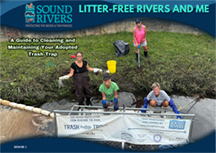Tag: Amin Davis
Current Action Alerts
September 25, 2024
Current Action Alerts
Make your voice heard!
Your voice can make a difference in the fight to stop pollution. Sound Rivers’ Action Alerts are set up to make it super-easy for you to weigh in on what matters to you. Since you’ve landed here, we already know you care about the health of your waterways — waterways that belong to YOU, not polluters. Here’s an opportunity to make your voice heard, whether you’re weighing in on permit being considered, ineffective regulations contributing to pollution or legislation that will codify harms to your waterways into law.
Sound Rivers’ Action Alerts are pre-written, but you can always add your own comments to the draft message, or even delete the draft message altogether and make it wholly your own. All that’s needed is your name and email address (occasionally, an Action Alert will ask for your physical address, solely to identify which elected official your email will be sent to).
If Sound Rivers has not created an Action Alert for any listing below, contact and other relevant information is available.
Blounts Creek
NPDES Permit Renewal Application for Martin Marietta Materials mine
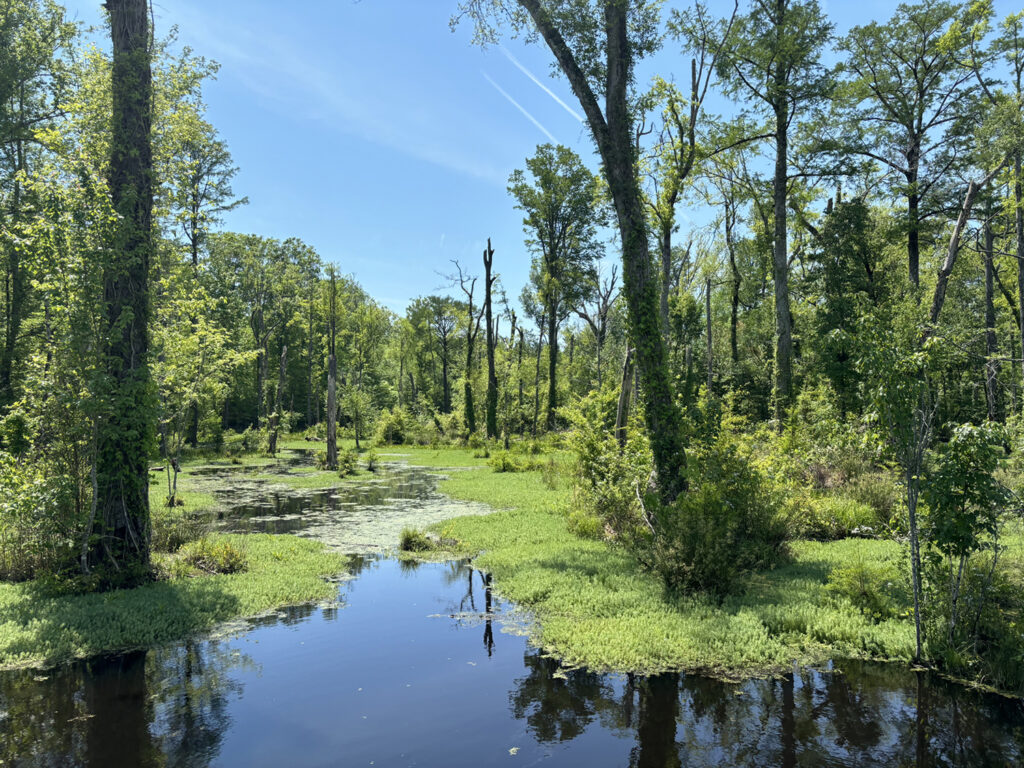
The fight to save Blounts Creek is not over.
Mining company Martin Marietta Materials has applied to renew its wastewater permit for a 649-acre limestone mine, and the North Carolina Department of Environmental Quality is accepting comments on the proposed permit. More than 400 comments about the mine and its potential impacts have been submitted to DEQ so far, so many that the Division of Water Resources has announced it will hold a public hearing in November, according to Pamlico-Tar Riverkeeper Katey Zimmerman.
“This is essentially our last chance to get the terms of the permit altered to better protect the water quality and ecosystems of Blounts Creek — as well as protect landowner wells — before they begin discharging up to 12 million gallons of water per day into Blounts Creek,” Katey said.
Sound Rivers has a long history with Blounts Creek. Find out more about the permit, its renewal and what’s at risk here.
Write your letter to NCDEQ with our Action Alert here.
Want to find out why it’s important to save Blounts Creek? Sound Rivers’ very first episode of its podcast “Sound Rivers: Riverkeeping Tales from the Neuse & Tar-Pamlico” is “The Story of Blounts Creek,” which explores exactly how mine discharge could destroy this pristine creek and how the battle to save it unfolded. Listen to it on soundrivers.org or search for keyword “riverkeeping” on Apple Podcasts, Spotify and Amazon Music.
Public comments will be accepted by NCDEQ until the public hearing.
Bridge Harbor Marina, Washington
Public comments sought for CAMA permit application
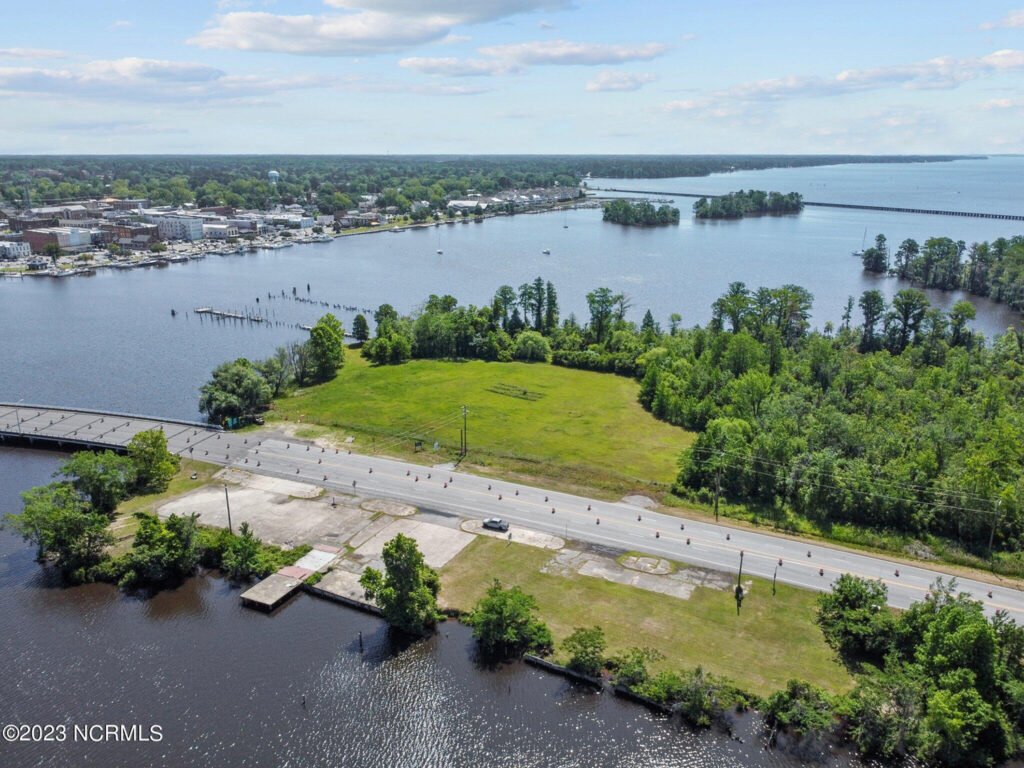
The North Carolina Department of Environmental Quality is accepting comments on a CAMA permit application for the construction of a marina at the southern base of the U.S. Highway 17 Business bridge in Washington. The proposed marina will have 133 boat slips, stick-built and floating docks, bulkhead, boardwalk, a boat ramp and boat lifts. The permit application is a scaled-down version of a project proposed in 2021 (read about the original project here). Sound Rivers is evaluating potential impacts and will comment in the near future.
For more information about the scope of this project, the Division of Coastal Management’s field report can be viewed HERE, and the permit application HERE.
Those who wish to comment can send an email to ashley.grandy@deq.nc.gov and Wayne.Hall@deq.nc.gov. Comments will be accepted up until the decision date, which will likely be “towards the 75-day review deadline for the project,” according to NCDEQ staff.
Durham: Lick Creek
Durham must adopt stronger ordinances to stop sediment pollution
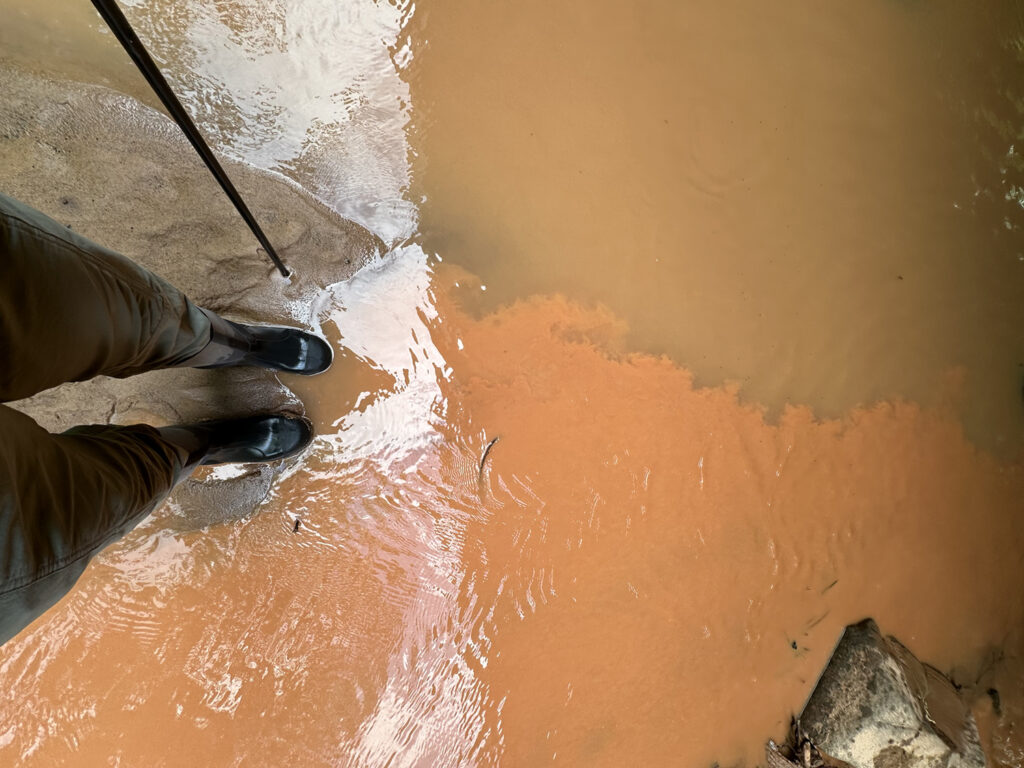
We need your help to protect Durham’s water quality!
Despite new regulations, new sprawling developments continue to pollute Durham’s waterways, and the Falls Lake drinking water supply downstream.
Large-scale land clearing developments are turning Durham’s rivers a “tomato soup” shade of muddy. For over two years, in partnership with community members, Sound Rivers has been documenting sediment runoff from active construction sites polluting streams and creeks. Southeast Durham’s most heavily developing Lick Creek watershed has regularly seen levels of sediment ten and twenty times over the state of North Carolina’s standard for healthy waterways. Ellerbe Creek at the heart of Durham has also gained attention for running orange since the start of this year due to runoff from a large development at its headwaters. All of the waterways in Durham’s Neuse River basin flow directly into Falls Lake, a drinking water supply for half a million total people.
The problem is that Durham’s Sediment and Erosion Control regulations have not yet caught up with the rapid scale of growth. In response to public outcry about Durham’s tomato soup creeks, Durham officials have adopted some measures to strengthen S&EC practices. However, we have not seen evidence that these new measures are working to prevent mud from polluting Durham’s public waterways.
We need your help to tell Durham’s City Council that enough is enough — Durham must adopt stronger protections for its waterways before annexing more large-scale land clearing developments in its sensitive watersheds! Lend your voice to this call to action!
Write your email to Durham city councilmembers here!
Want to learn more about sediment pollution in the Neuse and Tar-Pamlico watersheds? Neuse Riverkeeper Samantha Krop breaks the problem down in our Sound Rivers: Riverkeeping Tales from the Neuse & Tar-Pamlico” podcast. Look for the episode, “Muddied Waters” here. The podcast can also be found by searching for keyword “riverkeeping” on Apple Podcasts, Spotify and Amazon Music.
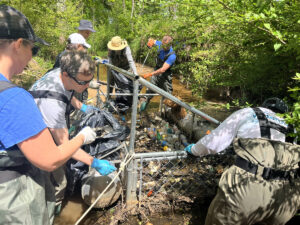
Adopt a Trash Trap!
September 19, 2024
Adopt a Trash Trap
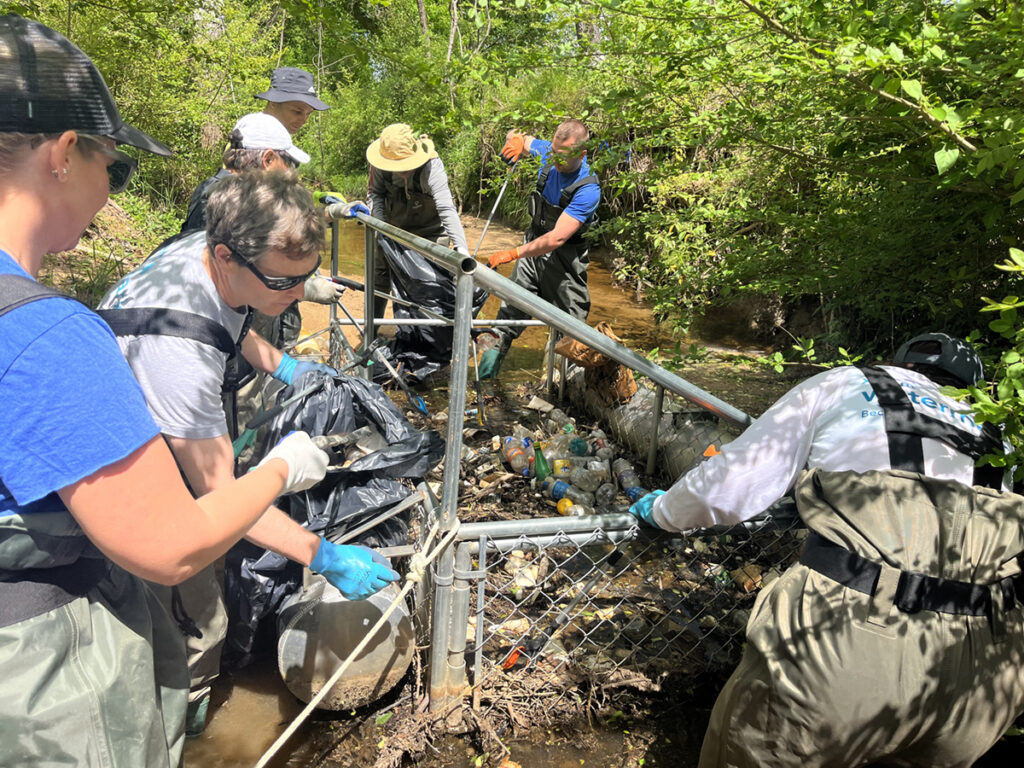
Want to do something good for your waterways? Adopt a Trash Trap!
Adopting a trash trap gives groups the chance to sign up for a month of monitoring the amount of trash collected by a trash trap, organizing clean-outs and participate in keeping local waterways clean. Groups aren’t defined in any way: it could be a student group, a civic group or even a group of friends.
Trash trap adopters will be responsible for monitoring the trap, cleaning it out at least once (or more if there’s a big storm), weighing the trash, then disposing of it, taking pictures and sending Emily photos and data. In return, Sound Rivers will promote the group on social media and provide up to five Sound Rivers shirts to the group.
Sound Rivers will supply waders, gloves, trash grabbers, trash bags and a scale for weighing the trash.
View and/or download the Adopt A Trash Trap handbook, checklist and data form by clicking on the links below!
Resources
Thank You
June 25, 2024
Thank You
Thank You!
Thanks for reaching out to us. We will be in touch with you.
Cart
May 13, 2024
You may be interested in…
Your cart is currently empty!
New in store
-
 Hindsley PlatformFrom: $110.00
Hindsley PlatformFrom: $110.00 -
 McMullen PlatformFrom: $110.00
McMullen PlatformFrom: $110.00 -
 Cypress Hideaway PlatformFrom: $110.00
Cypress Hideaway PlatformFrom: $110.00 -
 Tim Barkley Memorial PlatformFrom: $110.00
Tim Barkley Memorial PlatformFrom: $110.00
Sound Rivers Podcast
April 17, 2024
Sound Rivers Podcast
Riverkeeping Tales from the Neuse & Tar-Pamlico
Sound Rivers has joined the podcasting craze, launching its NEW podcast, “Sound Rivers: Riverkeeping Tales from the Neuse & Tar-Pamlico.” Join podcast host Vail Rumley (also Sound Rivers’ communications director) on a journey through stories from the field, from the lab and even from the courtroom — all the work Sound Rivers’ Riverkeepers and staff do to keep your rivers fishable, swimmable and drinkable for all.
Each month we’ll have a new episode, tackling a wide array of issues, from pollution investigations to green stormwater infrastructure, climate change to bad legislation. If it impacts your rivers, we’ll be talking about it!
“Sound Rivers: Riverkeeping Tales from the Neuse & Tar-Pamlico” is now available on Apple Podcasts, Spotify and Amazon Music (just search for the title).
Episode 1: The Story of Blounts Creek
This is the story of Blounts Creek, a pristine, peaceful tributary of the Pamlico River in Beaufort County, North Carolina, and the decade-long battle to prevent a mining company from destroying it.
In 2011, environmental nonprofit Sound Rivers’ staff discovered plans for a limestone mine — plans that included using Blounts Creek to discharge up to 12 million gallons of fresh water into the brackish headwaters of the creek every day.
At risk was an entire ecosystem.
In this episode, you’ll hear about the grassroots movement founded to protect the creek, its habitats, fisheries and wildlife for future generations and the legal battle that would start on the banks of the creek and end in the highest court in North Carolina.
Featuring Blounts Creek resident Bob Daw, one of the founders of Save Blounts Creek, and former Pamlico-Tar Riverkeeper, now Sound Rivers executive director, Heather Deck, the Story of Blounts Creek takes on decisions made by the state to potentially destroy what it’s meant to protect, in direct conflict with the Clean Water Act; the efforts by a giant corporation to deprive North Carolina residents of access to the courts; and how a community continues to rise up against what could be a devastating wrong.
Help support the fight for Blounts Creek by donating to Sound Rivers today!
Episode 2: To Swim, Drink, Fish
This episode is all about Swim Guide: what it is, how it works, where it started and what it takes to keep it running ALL summer long!
Since 2017, Sound Rivers has been a part of Swim Guide, sampling and testing popular recreational sites on the Neuse and Tar-Pamlico and sharing the results with anyone who wants to know where it’s safe to swim. But we didn’t start this program. And we’re not the only ones doing it. Swim Guide is a worldwide phenomena.
Featuring Sound Rivers Program Director Clay Barber and Volunteer Coordinator Emily Fritz, and special guest Gregary Ford from SWIM DRINK FISH, this episode dives deep into Swim Guide and its role in helping us resolve real pollution problems on the Neuse and Tar-Pamlico.
Give a gift to support Swim Guide today!
Episode 3: Muddied Waters
In this episode, Sound Rivers’ Neuse Riverkeeper Samantha Krop takes a deep dive into the No. 1 pollutant in North Carolina waterways: sediment.
It’s dirt, it’s natural, so why is so much of it ending up in, and harming, streams, creeks and rivers? Samantha explains how sediment pollution happens, where it’s happening, what it harms, who’s responsible and why not much is being done to stop it in “Muddied Waters.”
*There is one correction we’d like to make to the Muddied Waters podcast: the particles of soil in southeast Durham were said to be 2 mm in size; they are actually .002 mm (way smaller!).

